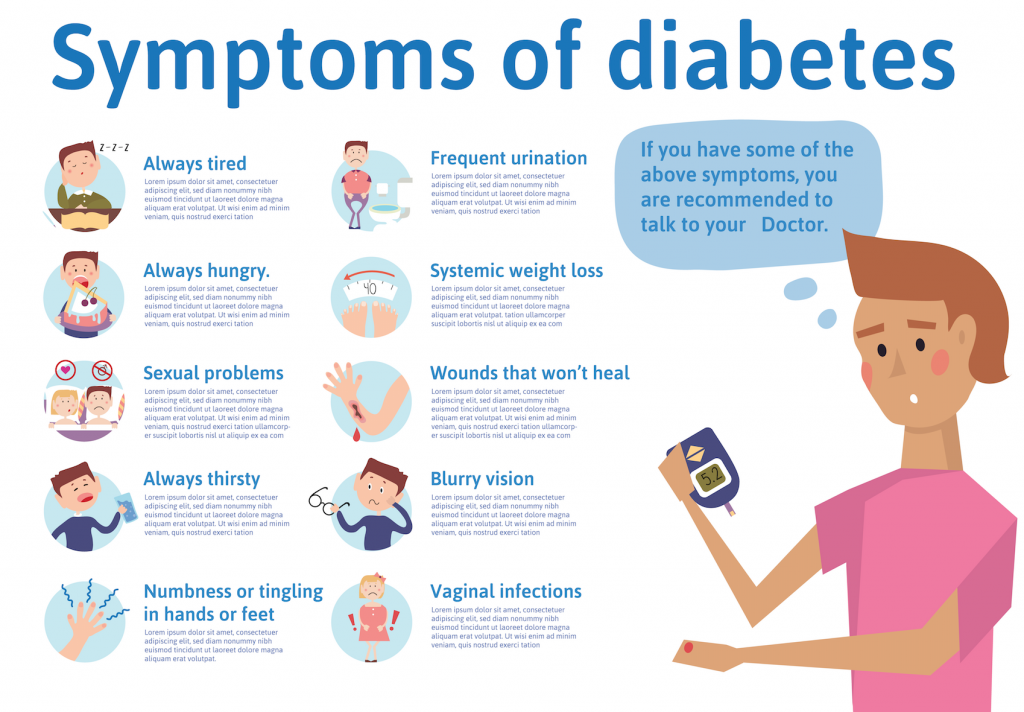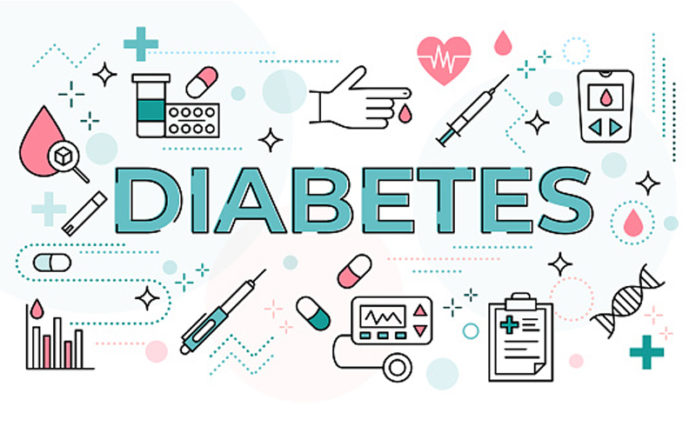Diabetes is a serious, yet common medical condition. And it affects more than 29.1 million people in America alone. Of those with diabetes, 8.1 million are undiagnosed.
However, the biggest reason for this high number is the fact that people are not well educated about this disease, even though they think they are.
If you have diabetes, you need to manage your blood sugar and regularly monitor it to be sure it is within its target range. Diabetes affects blood sugar and diet can play a major role in its regulation. While many people do not feel any symptoms. Many people with diabetes get blurry vision, an inability to heal injuries, and excessive thirst. That is only a small part, there are other signs that you should be aware of.
Being able to recognize these signs is important. The good news is it can be managed with correct treatment and lifestyle changes to regulate your condition, keep the disease under control and prevent further complications.
Read on to learn more about these early warning signs of diabetes and how to start treatment as early as possible.
These are the diabetes early warning signs that you need to know:
Constant itchiness
Itchy skin is one of the first symptoms that is often caused by diabetes. It affects a variety of conditions, including:
• Poor circulation, often in the lower legs
• Yeast or fungal infection
• Dry skin
Worsened skin quality
Dark, velvety discoloration in the folds of your skin is called acanthosis nigricans, which is a sign that your insulin resistance is increasing. An indication that the hormone insulin is becoming less efficient in regulating blood glucose levels.
It causes dark patches on the skin, especially on the knuckles, elbows, and back of the neck. The skin in the affected area also becomes thickened. Yet, weight loss and topical use of effective ointments prescribed by an experienced dermatologist can help you alleviate these issues.

Hearing loss
It’s known that high blood sugar can damage blood vessels throughout the body, including your ears. Loss of hearing is the third most common health problem amongst Americans. A study by the National Institute of Health found that hearing loss may be experienced in the pre-diabetes stage, which is manifested by elevated sugar levels and a 30% increase in hearing loss.
Prediabetic adults were also found to have a 30% higher rate of hearing loss than those with normal blood sugar. According to researchers, diabetes damages the nerves and blood vessels in the ear and thus leads to hearing loss.
These early warning signs generally mean that neuropathy is developing. People with diabetes will develop some form of nerve damage, especially if it goes uncontrolled for many years and blood glucose levels remain abnormal. When blood glucose levels remain high, nerve fibers throughout the body become damaged, leading to tingling, numbness, and pain. This is generally experienced in the extremities, such as your hands, legs, or feet.
Extreme fatigue
Just like other common early symptoms, extreme fatigue is one of the hallmark symptoms of diabetes. It’s sometimes called diabetes fatigue syndrome. Researchers don’t know exactly why it occurs.
Studies show that people with type 2 diabetes experience extreme tiredness and fatigue and it can significantly disrupt everyday life. People with this type of extreme fatigue use up their energy sources without necessarily being active. This means your body will not be getting enough fuel. In this case, your energy levels will significantly dip.
When you’re diabetic, food is not being broken down and used by cells as it should be. When blood sugar levels are high among those with insulin resistance, it can affect the body’s ability to transport glucose into cells.
According to Sheri Colberg, Ph.D., FACSM, and Professor Emerita of Exercise Science, “excessive feelings of tiredness or fatigue are commonly associated with diabetes, but the causes may be multifactorial.”
She explains that “the most common cause is the rise in blood glucose levels, which can make you feel sluggish and lethargic.”
Colberg also points out that people may experience fatigue as the result of some diabetes-related complications, such as kidney disease, or as a side-effect of some medications.
Increased hunger especially after eating
Intense hunger, or polyphagia, is also an early warning sign of diabetes.
If you have diabetes, your body either cannot produce insulin or does not use insulin properly, as a result, your body is constantly looking for more fuel, causing you to remain unsatisfied and feel the urge to eat more.

What to do if you’re experiencing early signs of diabetes?
It’s possible that you may not be living with diabetes and many of the early symptoms of diabetes mimic those of other conditions.
If you think, you may be experiencing any of these early signs of diabetes, you must consult a doctor as prevention is always better than cure.
Your doctor may want to know:
• Your symptoms
• Family history
• Medications
• Allergies
Your doctor will ask you questions about your symptoms and may decide to run some tests.
There are several tests to diagnose diabetes:
A1C: This test shows what your blood glucose level has averaged for the last 2 or 3 months. This does not require you to fast or drink anything.
Fasting plasma glucose (FPG): You will need to fast for at least 8 hours before this test.
Oral glucose tolerance (OGTT): This test takes 2 to 3 hours. Your blood glucose levels are tested initially and then repeated at intervals for 2 hours after consuming a specific sweet drink.
Random plasma glucose test: You can have this test any time and do not need to be fasting.
To sum it up, even though a disease may be common, it does not mean you know all about it. Early diagnosis and swift treatment can significantly reduce the risk of later complications.
Diabetes is a manageable condition, especially when found early. You can reverse the symptoms of diabetes naturally by changing diet, activities, and even mentality, all of which contribute to the disease.
Still, you must visit your doctor and get the proper diagnosis to reassess your condition.
Life doesn’t end with diabetes, but it is a wake-up call. Through diet and exercise, you can reverse it. Don’t wait until serious complications arise; think critically and make independent, informed decisions, you become empowered.
You can still live a full life even if you have diabetes. It only requires management and planning. Take charge of your health now! Just stay focused and maintain a positive attitude and you will succeed.



